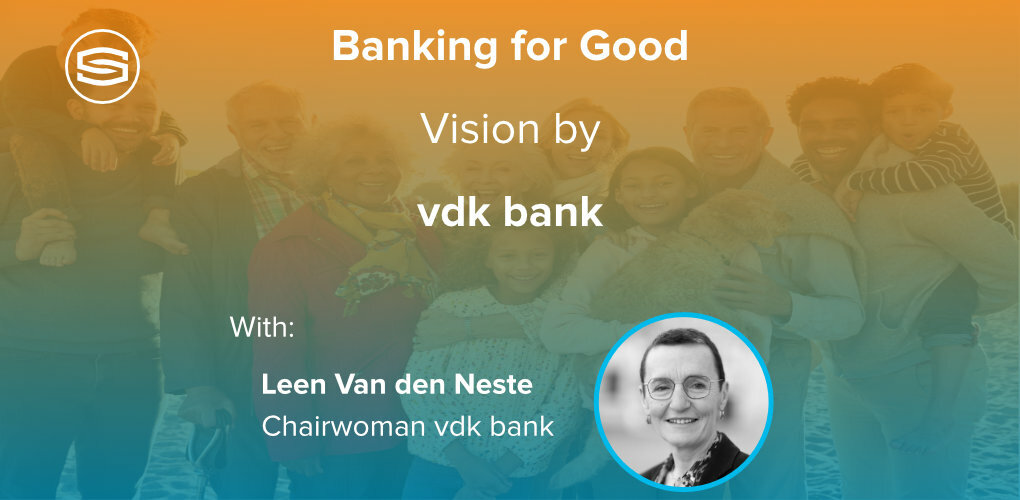
Insights & Opinions
Banking for Good - a Vision by vdk bank
Tue, 19 Oct 2021


Once upon a time, life was a matter of survival. That was not different in Belgium, a not so well-developed country back then.
Our Afterwork session on October 14 made me realise that the societal problems that FinTech companies try to resolve today are not new. We invited Leen Van den Neste that day, Chairwoman at vdk bank.
vdk bank is a local Belgian bank, and proud of its roots in Ghent, "one of the most beautiful Belgian cities, if not the most beautiful and probably one of the more beautiful cities in Europe", as Leen described it.
Beyond the hype of purposeful banking
The bank was founded in 1926, three years before the largest financial crisis of the 20th century. The Ghent-based workers association and a few local leading families established the bank with a very clear purpose.
That's right, many talk about purpose today, but this example is 95 years old. Their purpose, the mission of vdk bank back then, was to improve financial inclusion and to stimulate more emancipation in an era where labour rights were minimal, social security was still to be invented, and many people were in financial stress, unable to think ahead in life.
"Banking may seem boring or may seem complicated to some people. But I think banking is actually one of the most beautiful jobs in the world. Because we can help people create their dreams, we can help people to create a home for their families", explained Leen.
Back in 1926, vdk bank focused mainly on saving: "We wanted the workers to save a little bit of money for their household. Women were not working those days, it was a man providing for their households. We wanted to push them to save some money." Later came mortgages and other credit products.
In terms of purposeful banking, 1992 is another milestone. The bank constituted Incofin, a cooperative institution that finances microfinance institutions throughout the world. This to have even more impact when it comes to financial emancipation and inclusion.
"70% of Incofin's end-customers are women that can build a better world for their families, by the financing solutions that they get from Incofin. This is one way of how we reinvent purposeful banking and financial inclusion", shared Leen.
Transparency first
"It's important for all banks and for the entire sector to try to think about any negative effects of actions that we take. If we finance a company that may negatively affect the world, we need to take that in mind and try to mitigate those negative effects. That's an overall responsibility for the entire sector."
With the sustainable agenda on their plate, banks still have much work to do, not just to lift their transparency in terms of carbon footprint but also to better understand the impact on the climate of their clients and share this information with their stakeholders.
"We are working with people's money. We must use that money in the way we display it on our website, or we say in our annual report. I think it's very important to be transparent and follow the strategy that we explained to the people. And lastly, of course, to pay our taxes. In my opinion, it's imperative as a sector also to contribute to society and paying the taxes instead of helping with any tax evasions schemes."
The role of vdk bank in the Belgian banking landscape
Because of its history vdk bank lives close to its values. Proximity is one of those values. This explains that when other banks close their branches, vdk bank is probably the only one that keeps growing its branch network.
One of the reasons, therefore, according to Leen, is: "We believe it's important to guide our customers from their birth until death. We stand along their side, work together, have face-to-face contacts, talk about their goals, and try to realise their dreams."
This bank understands that digital banking services are a minimum for their customers, but they also acknowledge that some people and situations require more attention, human attention. That was not any different during exceptional times like the pandemic, explained Leen: "We were open, and you could just go to the cashier and have everything done you wanted."
Another aspect of this proximity is also short decision lines that facilitate more value-driven governance, according to Leen. With skyrocketing prices of gas and energy, leading to more poverty, vdk bank is setting up a partnership with a technology company that helps its customers to track costs and benefits of renovation, both from a financial and a climate change perspective.
Leen also gave a third example of how vdk bank is redesigning the Art of Banking linked to proximity, and that is a new program to help start-ups: "We want to become top of mind for purpose-driven starters, both for financing solutions but also for support with advise on for example how to structure the company or how to market their products". This will be rolled out in the coming years, starting in the vibrant start-up scene in Ghent.
Stronger together
A recurring question is whether small savings or community banks still hold a future. The answer from the audience was unanimously “yes”, but it will sometimes take bold decisions to (a) find the banks identity that appeals to people and (b) find solutions to rationalise the maintenance cost of the bank.
Collaboration within the industry is one path to achieve that. Like in the Netherlands, Belgian banks came together and joined forces to reduce the cost of their ATMs. For Leen and also other bankers in the audience, this is only the start.
There are plenty more opportunities outside the competitive space for banks to collaborate, not only the pure AML and KYC use case, by the way. As someone noted: sustainability is presented as a differentiator by many banks today, but in the future, we can expect platforms for banks to keep control over the regulatory minimum at a reasonable cost.
Conclusion
Banking for Good sessions are always inspirational, and this was no exception to this rule. The element I will never forget about this session is the roots of vdk bank. Like many other banks they think about purpose, but this bank was founded on an existential problem in society.
It is a good example of what the concept of corporations initially was used for: “an organisation authorised by the state to act as a single entity and recognised as such in law for certain purposes”.
Luckily today, we start to see a revival of that concept, a concept that isn’t new, but one that, in a way we simply ignored.



